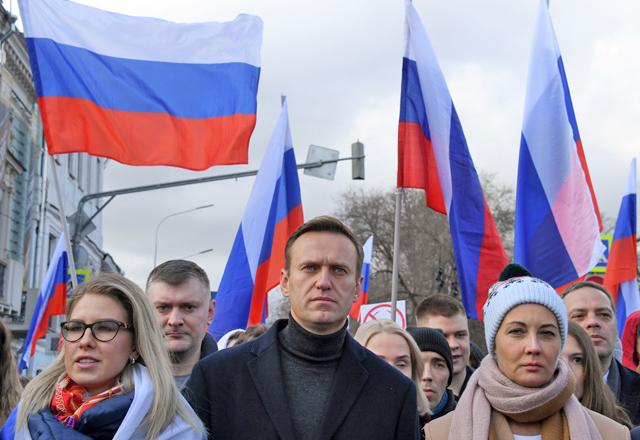You are here
Navalny poisoning shatters Macron’s Russia reset dream
By AFP - Sep 09,2020 - Last updated at Sep 09,2020

French President Emmanuel Macron delivers a speech as he visits the Hall 32 in Clermont-Ferrand, on Tuesday (AFP photo)
PARIS — The alleged poisoning of Russian opposition figure Alexei Navalny with the Novichok nerve agent has dealt a blow to French President Emmanuel Macron’s strategy of rapprochement with Russia, which troubled some EU allies, analysts say.
France has throughout the crisis stood shoulder to shoulder with its close partner Germany, where Navalny is being treated after falling ill on a flight from Siberia and which has told Moscow only a full investigation can lift suspicions of a state-sponsored attack.
Analysts say Macron’s much-heralded outreach to Russian counterpart President Vladimir Putin had — despite some high-profile diplomacy — so far failed to bring any concrete results.
Paris-Moscow dialogue is unlikely to be severed completely, but the dispute has already claimed its first casualty in relations with the cancellation of a planned meeting in Paris next week between the countries’ foreign and defence ministers.
Next to go could be a trip by Macron to Moscow that had been scheduled for the early autumn.
“We can continue to discuss, yes. But to continue this illusion of rapprochement only weakens Europe and the cohesion of the EU,” said Nicolas Tenzer, professor at the Paris School of International Affairs.
“I do not see how this can continue in these conditions without sending extremely disturbing signals to our European allies,” he told AFP.
Macron, he added, should be careful not to harm his credibility as a European leader after successfully spearheading a post-coronavirus economic relaunch plan with Germany.
“All this risks being undermined by a position that no one would understand towards Russia,” he warned.
Putin and Macron had agreed in telephone talks this summer that the French president would visit, but this is now under threat, a French diplomatic source said. “Everything is possible,” the source added.
‘Cannot fail to react’
The crisis moved to a new level last week after Germany announced that Navalny had been poisoned with Novichok, the same nerve agent used to poison former agent Sergei Skripal in Britain in 2018, an attack the West blamed on Russian military intelligence.
“It is a chemical, military weapon, it is the State that manufactures it. Moreover, it happened before. France cannot fail to react to this,” said Tatiana Kastoueva-Jean, Russia expert at the French Institute of International Relations.
Macron “is squeezed between the desire to resume dialogue with Moscow, despite all the negative factors, and the desire to play the role of leader in Europe”, said Kastoueva-Jean.
The French president also had to take into account the views of Poland and the three Baltic States who had been ruffled by his overtures to Putin, she added.
But she said dialogue would continue on issues of shared interest, notably the conflict in Libya and the Iranian nuclear crisis.
Macron set out his Russia strategy in an explosive interview with The Economist in November 2019, when he declared NATO was brain dead and said Europe needed to have a strategic dialogue with Russia.
Examining Russia’s long-term strategic options under Putin, he said Russia could not prosper in isolation, would not want to be a “vassal” of China and would eventually have to opt for “a partnership project with Europe”.
‘No tangible results’
Macron gave Putin the rare honour of a high-profile summit at his Mediterranean summer residence, the Bregancon fortress, in August 2019. He hosted him again in Paris in December for the Kremlin chief’s first peace talks with Ukrainian President Volodymyr Zelensky.
But even top French officials have admitted the president has little to show for his efforts.
“If the question is ‘are there already tangible results in the dialogue that France launched with Russia?’ I would answer you very honestly that this is not yet the case,” Defence Minister Florence Parly said in July.
While Germany is under pressure to abandon the controversial Nord Stream 2 gas pipeline after the poisoning, France has no such banner project with Russia after cancelling the sale of two Mistral warships over the Ukraine crisis.
But the scrapping of the meeting between the countries’ foreign and defence ministers — scheduled for September 14 in Paris — may only be the start.
“How can they behave as if nothing has happened?” said Francois Heisbourg, special advisor for the Foundation for Strategic Research.
Related Articles
BRUSSELS — The EU on Wednesday agreed to impose sanctions on six people and one entity over the poisoning of Russian opposition leader Alexe
MOSCOW — The Kremlin on Monday denounced "absurd" attempts to blame Russia for the alleged poisoning of opposition figure Alexei Navalny, as
BERLIN — Tensions deepened between Germany and Russia over the alleged poisoning of opposition figure Alexei Navalny on Sunday, with Germany












